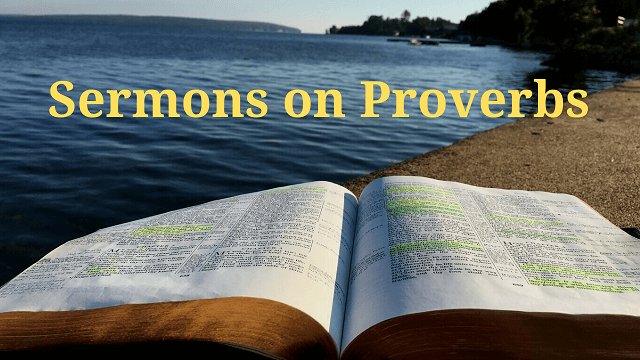Proverbs 11:10 (Mini Sermon)
Submitted by Pastor Chad Wagner on Wednesday, February 15, 2023.


10. Pro 11:10 – "When it goeth well with the righteous, the city rejoiceth: and when the wicked perish, there is shouting." A. When it goeth well with the righteous, the city rejoiceth: i. Definitions a. Well adv. – I. 1. a. In accordance with a good or high standard of conduct or morality; in a way which is morally good. Chiefly with do vb. 6. a. Prosperously, successfully, fortunately, happily; without harm or accident. Freq. with do, fare, go. c. Successfully in some material respect; profitably; advantageously. b. Righteous adj. – 1. a. Of persons: Just, upright, virtuous; guiltless, sinless; conforming to the standard of the divine or the moral law; acting rightly or justly. c. Rejoice v. – 1. trans. To enjoy by possessing; to have full possession and use of (a thing). Obs. 2. To gladden, make joyful, exhilarate (a person, his spirits, etc.). d. In other words, when just, upright, and virtuous people who conform themselves to the standard of God's law experience success and prosperity in their endeavors, the people of their city will be glad and joyful for them. ii. We should rejoice with those who rejoice and be happy for people who do well according to God's standards (Rom 12:15). iii. Examples a. A righteous man is acquitted of a crime he didn't commit. b. A righteous man attains a position of authority (Pro 29:2; Est 8:15-17). c. A righteous man is honored for a great accomplishment. d. A righteous man is successful in a business endeavor. e. A righteous man is victorious in a quest against wickedness. f. A righteous man wins a lawsuit against a corrupt government. g. Righteous people fight for their lives and freedom and destroy their enemies (Est 9:17-19). iv. When things like these happen, the city rejoices. v. "It is here observed, that good men are generally well-beloved by their neighbours, but nobody cares for wicked people. It is true there are some few that are enemies to the righteous, that are prejudiced against God and godliness, and are therefore vexed to see good men in power and prosperity; but all indifferent persons, even those that have no great stock of religion themselves, have a good word for a good man; and therefore when it goes well with the righteous, when they are advanced and put into a capacity of doing good according to their desire, it is so much the better for all about them, and the city rejoices. For the honour and encouragement of virtue, and as it is the accomplishment of the promise of God, we should be glad to see virtuous men prosper in the world, and brought into reputation." (Matthew Henry, Pro 11:10) B. and when the wicked perish, there is shouting. i. Definitions a. Wicked adj. – 1. Bad in moral character, disposition, or conduct; inclined or addicted to wilful wrong-doing; practising or disposed to practise evil; morally depraved. (A term of wide application, but always of strong reprobation, implying a high degree of evil quality.) b. Perish v. – 1. a. intr. To come to a violent, sudden, or untimely end; to suffer destruction; to lose its life, cease to exist, be cut off. c. Shouting n. – 1. a. Loud crying, uproar, clamour; vociferous applause, acclamation; an instance of this. d. In other words, when evil and morally depraved people suffer destruction and die, the people of their community will celebrate it loudly. ii. Things going well with the righteous, and the wicked perishing, are connected with each other via the conjunction and. iii. A city will be full of rejoicing and shouting both when things go well with the righteous and when the wicked are judged and killed. iv. Examples a. When the Egyptians were destroyed in the Red Sea, Israel rejoiced (Exo 15:20-21). b. Israel sang a song of rejoicing when Jabin king of Canaan was destroyed (Jdg 4:24 c/w Jdg 5:1-3, 31). c. Men shall clap their hands at the destruction of wicked men (Job 27:19-23). d. The righteous rejoice when they behold the vengeance of God upon the wicked (Psa 58:10-11). e. Mystery Babylon's destruction was accompanied with rejoicing by the holy apostles, prophets, and others in heaven (Rev 18:20; Rev 19:1-7). v. We should not rejoice when our personal enemies stumble and fall (Pro 24:17-18; Job 31:28-30). a. We should not be glad at the calamities of people when misfortunes happen to them which are common to men (Pro 17:5). b. But to rejoice in God's judgment of the wicked is perfectly acceptable which the previously cited verses show. vi. When the wicked perish, the righteous increase (Pro 28:28b). vii. But when the wicked rise to power they hide themselves (Pro 28:12, 28a). viii. "Wicked people may perhaps have here and there a well-wisher among those who are altogether such as themselves, but among the generality of their neighbours they get ill-will; they may be feared, but they are not loved, and therefore when they perish there is shouting; every body takes a pleasure in seeing them disgraced and disarmed, removed out of places of trust and power, chased out of the world, and wishes no greater loss may come to the town, the rather because they hope the righteous may come in their stead, as they into trouble instead of the righteous, Pro 11:8. Let a sense of honour therefore keep us in the paths of virtue, that we may live desired and die lamented, and not be hissed off the stage, Job 27:23; Psa 52:6." (Matthew Henry, Pro 11:10)
| Attachment | Size |
|---|---|
| Proverbs 11.10.mp3 | 15.7 MB |
